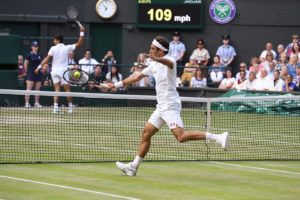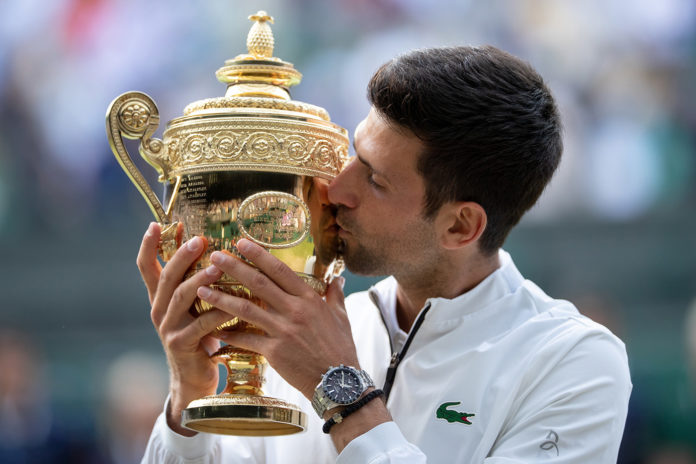2019: Novak Djokovic beat Roger Federer 7-6 (5), 1-6, 7-6 (4), 4-6, 13-12 (3)
The score is 7-7 in the fifth set, 30-40 on the Novak Djokovic serve. He takes his time, taking advantage of the fact that there is no shot clock at Wimbledon, and then hits a strong serve wide. Roger Federer takes a sharp step to his left and just about manages to get the ball back with a backhand slice.
The momentum and placement of the serve brings Djokovic up to the net, and he plays a short forehand cross court. Federer has already gotten into position in the meantime, notices where his opponent is placed, and then, just as he has countless number of times in his career, plays an effortless angled cross court passing winner. Federer had secured the break. Now he would serve for his ninth Wimbledon title.
WIMBLEDON THROWBACK: Venus rediscovers her magic on grass
A few minutes later, Federer is serving on his second Championship Point, the score at 40-30. He serves it down the middle and comes up to the net. The next volley is deep to Djokovic’s forehand side. That’s when the Serb plays a passing winner almost identical to what Federer had played in the previous game.
The rules at Wimbledon in 2019 dictated that the deciding set of each match would end in a tiebreaker, to be played once the game-score is 12-12. And with neither Djokovic, nor Federer refusing to let go of the chance to add yet another major to their already impressive tallies – Federer was on 20, Djokovic on 15 – this was to be the first match in the Grand Slam to be decided in a tiebreaker.
WIMBLEDON THROWBACK: Federer v Nadal 2008 – The greatest game ever played?
And for a match that lasted four hours and 57 minutes, the longest ever at the competition, a tiebreaker was, arguably, and cruelly, the only way to find the winner.
Partisan crowd
On July 14, in another part of London, hosts England were playing, in front of a home crowd, New Zealand in the Cricket World Cup final. At SW19, on Centre Court, Djokovic and Federer too entered a final in front of a partisan crowd.
Federer, 37 at the time, was the darling on the All England Club. He was the 20-time Grand Slam champion who won his first major on this very court 16 years earlier. Facing him was the younger Djokovic, the defending champion and top seed in his own right, but long considered a mere pretender to the Federer-Nadal rivalry that is tennis’ answer to football’s Pele-Maradona, or Messi-Ronaldo debate.
Djokovic had beaten Federer in the only two Wimbledon finals they had met in, 2014 and 2015. But for this 2019 final, Federer was the one the fans wanted to see win.
“When the crowd is chanting ‘Roger’ I hear ‘Novak,’” Djokovic, 32 at the time, later said. “It sounds silly, but it is like that. I try to convince myself that it’s like that.”
WIMBLEDON THROWBACK: Graf back to winning ways | Roger returns to the throne
For every awe-inspiringly brilliant winner second seed Federer would hit, Djokovic would register an unglamorous one of his own to earn equal reward. In every way possible – be it the quality of shots, the aggressive intent, or the total number of points won (Federer dominated almost all stats) – Federer won. But Djokovic won the points that needed to be won, and the biggest stat that read in favour of his name was on the final scorecard.
“I thought, most of the match, I was on the back foot actually,” Djokovic would say. “I was defending. He was dictating the play. I just tried to fight and find a way when it mattered the most, which is what happened.”
WIMBLEDON THROWBACK: Edberg bags bragging rights over Becker
Drama of the first four sets
Neither player refused to budge and so the opener was to be decided in the tie-breaker, with Djokovic just about pipping the Swiss 7-5.
In the second set though, Djokovic dropped a gear just as Federer started to pick up the pace. The eight-time Wimbledon champion drew inspiration from the court where he’s won most of his majors, and broke his opponent thrice to seal the second set 6-1.
WIMBLEDON THROWBACK: Ashe cuts Connors down to size | When Sampras was taken the distance
Djokovic’s reply in the third was simply to not be broken. His intent seemed laboured by fatigue, but he hung in there, enforcing a second tie-breaker. And then somehow, against the run of play, won it 7-4 to go up 2-1.
At this point Federer’s serve had not been broken.
The fourth set saw Federer yet again raise the tempo. He’d go on to break Djokovic twice, but lose serve once, en route to taking the match into the fifth set.

The decider
This was the fifth time Federer had been in a Wimbledon final that needed the fifth set to decide it, he had won only the 2007 and 2009 finals.
WIMBLEDON THROWBACK: Navratilova’s reign begins | Goran becomes peoples’ champion
Federer had started to tire, but the artistry was still on display. The man from Basel was thumping down winners and creating openings in ways unmatched by any other player. Yet Djokovic, now playing on fumes, was still holding on.
At 7-7, on the Serbian’s serve, Federer drew first blood. And then Djokovic saved two Championships Points, the second with a passing shot of equal beauty.
The set carried on, with neither player letting down in a display of gripping tennis. At 11-10, the fifth set had been on for an hour and 36 minutes – just a minute less than what it took for Federer to dispatch Jay Clarke in the second round. The tie-breaker beckoned.
WIMBLEDON THROWBACK: Graf outlasts Sanchez Vicario | Evert wins battle of the best
On the third point, Federer came up to the net after a good serve wide, but Djokovic’s return dipped viciously. The Swiss couldn’t control the half-volley that fell at his feet, playing the shot horribly wide to concede the mini-break.
At 5-3 in the ‘breaker, Djokovic played arguably his most beautiful shot of the match – a delightful backhand winner down the line to set up his first match point.
Serving at 6-3, Federer played a well disguised back-spin sliced shot, that Djokovic just about got to. The Serb scrambled to get back into position as Federer moved to convert a shot onto his forehand. But as he was about to let loose another winner, he inexplicably framed the ball into the stands.
Djokovic had become the first player since Bob Falkenburg in the 1948 final, to win the Wimbledon title after being down Championship Points.
WIMBLEDON THROWBACK: Graf’s hat-trick | Borg’s crowning glory
“If this was not the most thrilling and exciting finals I was ever a part of, then definitely it’s top two or three in my career against one of the greatest players of all time – Roger,” he said. “I respect him a lot. Unfortunately in these kind of matches, one of the players has to lose and, as Roger said, we both had our chances. It’s quite unreal to be two match points down and to come back.”
There was no wild celebration, nor a fall to the surface. The duo hugged in respect at the net. They knew what they had created was special.























